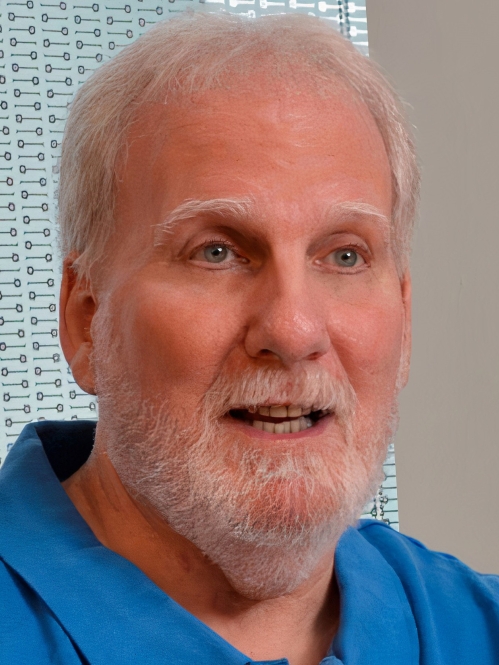Martin L. Yarmush

Research
Research
The research mission of our laboratory spans an ambitious and multidisciplinary spectrum of scientific and engineering challenges in biotechnology and bioengineering. Our focus areas include—but are not limited to—tissue engineering and regenerative medicine, targeted drug delivery, metabolic engineering, BioMEMS and nanotechnology, and the development of next-generation biomedical devices.
We take pride in conducting high-impact, original research that translates into real-world industrial, diagnostic, and therapeutic solutions. A recent example is our fully automated, image-guided robotic vascular access device with point-of-care capabilities ([watch demo]). This technology holds immense promise for standard venipuncture, intravenous catheter placement, real-time drug infusion, and hemodialysis access—fundamentally redefining vascular procedures by combining speed, precision, and minimal human error.
Other recent and ongoing projects include:
- Development of novel fusion protein nanoparticles to accelerate and enhance wound healing
- Tissue- and organ-on-a-chip systems for drug screening and disease modeling
- Microfabricated devices to boost non-viral gene delivery, including CAR-T cell applications
- Pulsed electric field techniques to promote scarless wound healing, eradicate infections, rejuvenate skin, and stimulate hair regeneration
- Encapsulation and delivery of mesenchymal stem cells for therapeutic use in spinal cord injury, traumatic brain injury, and osteoarthritis
- Mitochondrial transplantation as a pioneering strategy to restore cellular energetics in inflammatory diseases such as IBD, spinal cord injury, and traumatic brain injury
To tackle these complex challenges, we leverage a wide array of state-of-the-art technologies and methodologies, including:
- Genomics, proteomics, metabolomics, and genetic engineering
- Cell biology and stem cell-based tissue engineering
- Physical biochemistry and advanced molecular imaging
- Micro- and nanofabrication
- Physiologic instrumentation and in vivo animal models
- Computational modeling and numerical simulation
At the heart of our approach is a seamless integration of engineering, medicine, and life sciences. We thrive on collaborative partnerships that span academic departments, institutions, and continents. Our trainees are immersed in a culture that demands intellectual rigor, rewards curiosity, and encourages independent thinking. Whether in small group discussions or during our biweekly joint Berthiaume-Schloss-Yarmush research meetings, students and postdocs are taught to question assumptions, articulate the significance of their work, and take ownership of their scientific journey.
A defining feature of our lab philosophy is intellectual ownership. Each member is encouraged to chart their own path—selecting projects that genuinely align with their passions and long-term goals. Thanks to my broad academic and professional background, I can mentor across a wide range of fields and continuously generate fresh, original project ideas that defy convention. We strive to avoid derivative, “me-too” science; our goal is to lead, not follow. As I often tell prospective students and fellows: you will receive the best of a Harvard-MIT caliber research experience—without the institutional pathology.
Another hallmark of our lab is our strong track record in translation and commercialization. Our research has led to licensed patents and directly enabled the formation and growth of several startups, including Hµrel Corporation, Sentien Biotechnologies, Nivarta, eMembrane, HeproTech, VascuLogic, Novira (originally Molecmo Biotechnologies), and Organ Solutions. A particularly notable example is Novira Therapeutics, which originated from our work on RNA virus therapeutics and was acquired by Janssen (Johnson & Johnson) in 2015 for $600 million to advance a first-in-class therapy for chronic hepatitis B infection. Another highlight is our pioneering autonomous, image-guided robotic system for vascular access—integrating advanced biomedical imaging, computer vision, robotics, artificial intelligence, and automation. This first-of-its-kind system enables rapid, precise, and efficient blood draws, fluid delivery, catheter placement, and hemodialysis, representing a transformative leap forward in clinical practice.
Ultimately, what truly sets our lab apart is our culture. We are joyous, enthusiastic, and deeply grateful for the opportunity to do meaningful science together. We believe the research journey should not only be productive but also personally fulfilling. Our lab is not just a place to work—it is a place to grow, to explore, and to have fun.
Honors
- 2023: Ranked #8 in US Biomedical Engineering by AcademicInfluence.com rankings
- 2022: The Sackler Scholar, Sackler Institute of Advanced Studies, Tel Aviv University, Israel
- 2020: Daniel Gorenstein Memorial Award, Rutgers U
- 2018: Lady Davis Visiting Faculty Fellow & Institute Lecturer, Hebrew U, Jerusalem Israel
- 2017: Fellow, US National Academy of Engineering
- 2015: Robert A. Pritzker Distinguished Lecture Award, BMES
- 2015: Fellow, US National Academy of Inventors
- 2013: Top 20 Translational Researchers, Nature Biotechnology
- 2011: Food, Pharmaceutical & Bioengineering Division Award, AIChE
- 2009: Keynote Speaker, ASME Summer Bioengineering Conference
- 2006: Fellow, New Jersey High Tech Hall of Fame
- 2006: NIH Career Enhancement Award for Stem Cell Research
- 1993: Founding Fellow, American Institute of Medical and Biological Engineering
- 1992: Board of Trustees Award for Excellence in Research, Rutgers U
- 1989: NIH Research Career Development Award (K01), Rutgers U
- 1988: NSF Presidential Young Investigator Award, Rutgers U
- 1987: Lucille P. Markey Scholar Award in Biomedical Science, MIT
- 1984: NIH National Research Service Award (F32), MIT
Education
- MA, Medical Science, Harvard University (Honorary), 1995
- Postdoctoral, Immunology and Immunogenetics, National Institutes of Health (NIH), 1978-1979
- PhD, Chemical Engineering, Massachusetts Institute of Technology (MIT), 1984
- MD, Medicine, Yale University, 1983
- PhD, Biophysical Chemistry, The Rockefeller University, 1979
- BA, Biology/Chemistry, Yeshiva University, 1975